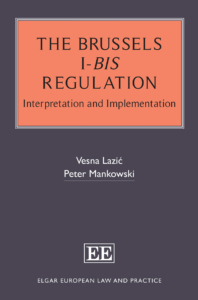Views
The concept of ‘right of access’ under Brussels II bis encompasses grandparents
In the judgment C-335/17 of 31 May 2018, the CJEU confirms that the autonomous concept of ‘right of access’ under Brussels II bis Regulation encompasses the rights of access of grandparents to their grandchildren. Read more
The “Coman” Case (C-673/16): Some reflections from the point of view of private international law
Written by Dr. iur. Baiba Rudevska (Latvia)
On 5 June 2018, the ECJ rendered a judgment in the Coman case (C-673/16). For the first time the ECJ had the opportunity to rule, on the concept of ‘spouse’ within the meaning of the Directive 2004/38/EC of the European Parliament and of the Council of 29 April 2004 on the right of citizens of the Union and their family members to move and reside freely within the territory of the Member States (Directive 2004/38) in the context of a same-sex marriage. Even if the Directive only covers questions related to the entry and residence in the European Union (EU), this judgment could be of interest for Private International lawyers as well. Read more
Petronas Lubricants: ECJ confirms that Art 20(2) Brussels I can be used by employer for assigned counter-claim
Last Thursday, the ECJ rendered a short (and rather unsurprising) decision on the interpretation of Art 20(2) Brussels I (= 22(2) of the Recast Regulation). In Petronas Lubricants (Case C 1/17), the Court held that an employer can rely on the provision to bring a counter-claim in the courts chosen by the employee even where said claim has been assigned to the employer after the employee had initiated proceedings.
The question had been referred to the ECJ in the context of a dispute between an employee, Mr Guida, and his two former employers, Petronas Lubricants Italy and Petronas Lubricants Poland. Mr Guida’s parallel employment contracts with these two companies had been terminated among allegations of wrongly claimed reimbursements. Mr Guida, who is domiciled in Poland, had sued his Italian employer in Italy for wrongful dismissal and his employer had brought a counter-claim for repayment of the sums Mr Guida had allegedly wrongfully received, which had been assigned by the Polish employer.
Art 20(2) Brussels I contains an exception to the rule in Art 20(1), according to which an employee can only be sued in the courts of their country of domicile, to allow the employer to bring a counter-claim in the courts chosen by the employee. Similar exceptions can be found in Art 12(2) Brussels I (= Art 14(2) of the Recast; for insurance contracts) and Art 16(3) Brussels I (= Art 18(3) of the Recast; for consumer contracts), all of which incorporate the ground for special jurisdiction provided in Art 6 No 3 Brussels I (= Art 8(3) of the Recast). In the present case, the ECJ had to decide whether this exception would also be available for counter-claims that had been assigned to the employer after the employee had initiated proceedings.
The Court answered this question in the affirmative, pointing out that
[28] … provided that the choice by the employee of the court having jurisdiction to examine his application is respected, the objective of favouring that employee is achieved and there is no reason to limit the possibility of examining that claim together with a counter-claim within the meaning of Article 20(2) [Brussels I].
At the same time, the Court emphasised that a counter-claim can only be brought in the court chosen by the employee if it fulfils the more specific requirements of Art 6 No 3 Brussels I, according to which the counter-claim must have arisen ‘from the same contract or facts on which the original claim was based’. This has recently been interpreted by the ECJ (in Case C-185/15 Kostanjevec) as requiring that both claims have ‘a common origin’ (see [29]–[30] of the decision). Where this is the case – as it was here (see [31]–[32]) –, it does not matter that the relevant claims have only been assigned to the employer after the employee had initiated proceedings (see [33]).
News
Transatlantic Dialogue in Private International Law: family and personal status, 12-13 October, Coimbra
The Institute of Legal Research of the University of Coimbra is organising an event in their series of Transatlantic Dialogues in Private International law. On 12 and 13 October the topic is Family and Personal Status on the Move.
The programme includes the main developments in family law and personal status, name, multiple parenthood, gender and polyamorous relationships. Besides, there is a session for young researchers, for whom the organisers opened a call for papers. A 300-word abstract should be submitted by mail to dulcel@fd.uc.pt and paulavit@fd.uc.pt. by 20 September.
See the Call for papers booklet
The organisers are Dulce Lopez, Guillermo Palao Moreno, Nicolas Nord and Paula Távora Vítor.
The event is hybrid, but registration is required.
Review of: Recognition and Enforcement of Foreign Arbitral Awards (Ferrari, Rosenfeld, & Kotuby Jr.)
Franco Ferrari, Friedrich Rosenfeld, & Charles T. Kotuby Jr., Recognition and Enforcement of Foreign Arbitral Awards: A Concise Guide to the New York Convention’s Uniform Regime
Cheltenham, Edward Elgar, 2023
178 pp. Hardback : £72 eBook: £20

Out Now: The Brussels I-bis Regulation (Lazic & Mankowski)
Vesna Lazic and Peter Mankowski, The Brussels I-bis Regulation: Interpretation and Implementation, Edward Elgar 2023 (602 pp)
This impressive book on the Brussels I-bis Regulation has just been published. It results from a project headed by Vesna Lazic (Utrecht University/T.M.C. Asser Institute) and the late Peter Mankowski (formerly University of Hamburg), in co-operation with Lucia Pein (Hamburg University), entitled ‘Regulation Brussels Ia: a standard for free circulation of judgments and mutual trust in the European Union’ (JUDGTRUST) funded by the European Commission’s Justice Programme (JUST-AG-2017/JUST-JCOO-AG-2017). The research for this project consisted among others of a questionnaire and national reports from all the Member States on the application of the Regulation. This book provides an extensive overview of the CJEU rulings and analysis of case law, which will be of great importance for future reference and the ongoing evaluation and revision of the Brussels I-bis Regulation.



